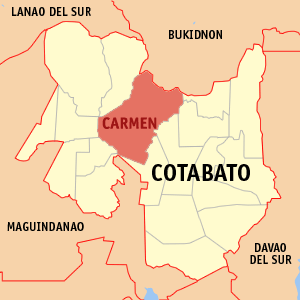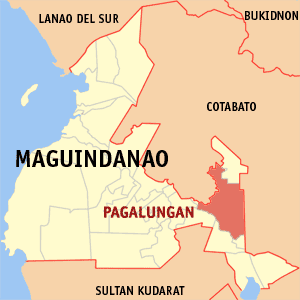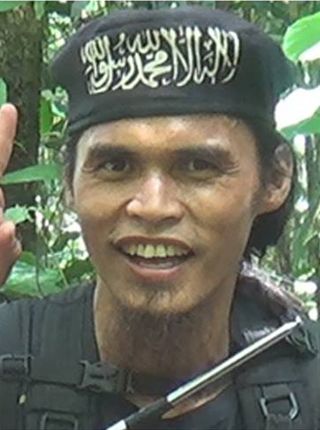
The Moro Islamic Liberation Front is a group based in Mindanao seeking an autonomous region of the Moro people from the central government. The group has a presence in the Bangsamoro region of Mindanao, the Sulu Archipelago, Palawan, Basilan, and other neighbouring islands. The armed wing of the group was the Bangsamoro Islamic Armed Forces (BIAF), although the name of its parent organization, the MILF, was often used to refer to the BIAF. In July, 2018, the Philippine government passed the Bangsamoro Organic Law, giving more autonomy to Muslims. In return, MILF announced that it would disarm its 30,000 fighters.

The Moro conflict was an insurgency in the Mindanao region of the Philippines, which has involved multiple armed groups, and has been ongoing since March 1968. Peace deals have been signed between the Philippine government and two major armed groups, the Moro National Liberation Front (MNLF) and the Moro Islamic Liberation Front (MILF), but other smaller armed groups continue to exist. In 2017, the peace council settled around 138 clan conflicts.
The 104th Infantry Brigade, 1st Infantry Division, Philippine Army, known officially as the Sultan Brigade, is one of the brigades of the Philippine Army which is organic to its 1st Infantry Division. It is an infantry unit, and specializes in anti-guerrilla warfare.

Ameril Umbra Kato was the founder of the Bangsamoro Islamic Freedom Fighters (BIFF), a group which seceded from the Moro Islamic Liberation Front (MILF). He joined the MILF in or around 1985, after he graduated from Imam Muhammad bin Saud Islamic University in Riyadh, Saudi Arabia. Umbra Kato was the Philippines' most wanted man, though due to his membership in MILF he was not hunted by the military. A warrant of arrest was filed against him alongside other BIFF members by the Philippine National Police. The Armed Forces of the Philippines, with the MILF, launched Operation Darkhorse in a bid to arrest him in January 2014.
The Bangsamoro Islamic Freedom Fighters (BIFF), also known as the Bangsamoro Islamic Freedom Movement, is an Islamist militant organization based in Mindanao, the Philippines. It is a smaller player in the overall Moro insurgency in the Philippines and is mostly active in Maguindanao and other places in central Mindanao. It is a breakaway group from the Moro Islamic Liberation Front founded by Ameril Umbra Kato. Following Kato's death, the group split into three factions, one of which has aligned with the Islamic State of Iraq and the Levant (ISIL), while the other two are less radical.
Operation Darkhorse was an offensive against the Bangsamoro Islamic Freedom Fighters (BIFF) launched by the Armed Forces of the Philippines on January 27, 2014.

The Comprehensive Agreement on Bangsamoro (CAB) is a final peace agreement signed between the Government of the Philippines and the Moro Islamic Liberation Front on March 27, 2014 at the Malacañang Palace in Manila. Under the agreement, the Islamic separatists would turn over their firearms to a third party, which would be selected by the rebels and the Philippine government. The MILF agreed to decommission its armed wing, the Bangsamoro Islamic Armed Forces (BIAF). In return, the government would establish an autonomous Bangsamoro. Power sharing was a central point to the autonomy redesign.

The Mamasapano clash was a shootout that took place during a police operation by the Special Action Force (SAF) of the Philippine National Police (PNP) on January 25, 2015, in Tukanalipao, Mamasapano, then-undivided Maguindanao. The operation, codenamed Oplan Exodus, was intended to capture or kill wanted Malaysian terrorist and bomb-maker Zulkifli Abdhir and other Malaysian terrorists or high-ranking members of the Moro Islamic Liberation Front (MILF).

The 1976 Tripoli Agreement was signed on December 23, 1976 in Tripoli, Libya by Carmelo Z. Barbero, representing the Government of the Philippines and Nur Misuari of the Moro National Liberation Front. The agreement defined autonomous administrative divisions for Muslims in the southern Philippines, the establishment of an autonomous government, judicial system for Sharia law and special security forces, and the observance of a ceasefire. The autonomous region was to have its own economic system, including an Islamic bank.
The 1996 Final Peace Agreement, also called the Jakarta Accord was signed on September 2, 1996 in Manila, Philippines by Manuel Yan, representing the Government of the Philippines and Nur Misuari of the Moro National Liberation Front. The culmination of four years of peace talks, the agreement established mechanisms designed to bring about the full implementation of the 1976 Tripoli Agreement.

The Battle of Camp Abubakar, codenamed Operation Terminal Velocity, was the final phase of the 2000 Philippine campaign against the Moro Islamic Liberation Front which resulted in the capture of Camp Abubakar al Siddique, stronghold of the Moro Islamic Liberation Front and its largest settlement, and seat of its Shariah-based government.

The 2000 Philippine campaign against the Moro Islamic Liberation Front was a military campaign conducted by the Armed Forces of the Philippines (AFP) against a Muslim secessionist group that took place during the presidency of Joseph Estrada in the Autonomous Region in Muslim Mindanao in the Philippines. The campaign was waged "to weaken the Moro Islamic Liberation Front's capability to undermine the territorial integrity of the Philippines and inflict harm on both government personnel and civilians".
Camp Iranun is a Philippine Army military base located in Barira, Maguindanao, Philippines. It is named after the Iranun people, a Moro ethnic group native to the area encompassing the boundaries of Maguindanao, Lanao del Sur and North Cotabato provinces.

Operation Audacity was a military operation during the 2000 Philippine campaign against the Moro Islamic Liberation Front which took place in Cotabato, Philippines. The Philippine Army, primarily units of its 6th Infantry Division, assaulted and cleared Moro Islamic Liberation Front forces from the Carmen-Banisilan area of Cotabato.

The Battle of the Buliok Complex took place on 11 February 2003 in an area within the provinces of Maguindanao and Cotabato in Mindanao, Philippines. The 60-hectare complex, which stretches from Pikit, Cotabato to Pagalungan, Maguindanao, was a stronghold of the Muslim separatist Moro Islamic Liberation Front (MILF). Accused by the Philippine government of harboring members of Pentagon, a notorious kidnap-for-ransom gang operating in Mindanao, the MILF was attacked in the Buliok complex by the Armed Forces of the Philippines under orders from then-President Gloria Macapagal Arroyo.

Omarkhayam Romato Maute was a Moro militant who co-founded, along with his brother Abdullah Maute, a Dawlah Islamiyah group in Mindanao, Philippines, commonly known as the Maute group after their surname.

Abdullah Maute was a Moro militant who co-founded, along with his brother Omar Maute, a Dawlah Islamiyah group in Mindanao, Philippines commonly known as the Maute group after their surname.

Abdulraof A. Macacua, also known by his nom de guerreSammy Gambar, is a Filipino politician who is the Executive Secretary and Environment Minister of Bangsamoro.

The Joint Peace and Security Team (JPSTs) are a peacekeeping forces composed of Philippine security personnel and Moro Islamic Liberation Front rebels in Mindanao.
On November 8, 2022, the Philippine Army and the Moro Islamic Liberation Front (MILF) engaged in a gunfight in Ungkaya Pukan, Basilan, while the army was conducting clearing operations on "lawless elements" allegedly taking refuge in the territory controlled by the MILF. Fighting between the two sides continued until November 10, 2022 when a ceasefire between two sides were signed.














